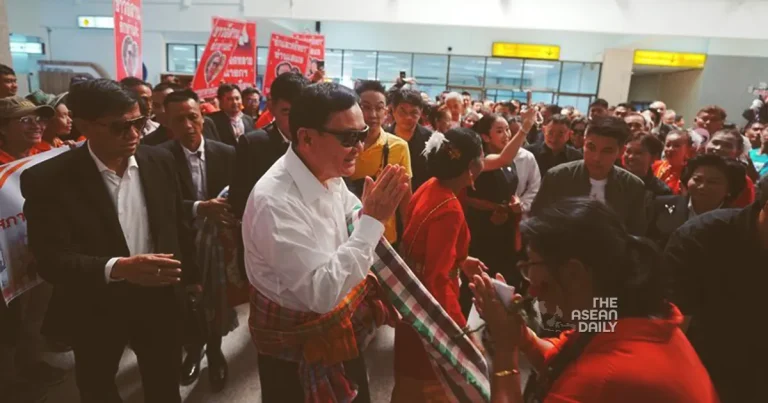4-6-2024 (BANGKOK) Amidst mounting concerns over the legal woes plaguing former prime minister Thaksin Shinawatra, Prime Minister Srettha Thavisin sought to allay fears of a potential flight from justice. In a candid statement on Tuesday, Srettha revealed his confidence that the embattled political figure would not attempt to flee the country once again, choosing instead to confront the lèse-majesté case leveled against him.
“I met with Paetongtarn Shinawatra, the leader of the Pheu Thai Party, this morning. I asked about her father. She said he is fine,” Srettha disclosed, referring to his discussions with Thaksin’s youngest daughter, who now helms the party he founded.
Srettha’s assurances come at a time when Thaksin’s legal battles have reignited concerns over his potential departure from Thailand, mirroring his earlier self-imposed exile in 2008. Back then, the former premier had fled the country shortly before the Supreme Court convicted him for his involvement in a controversial land deal that allowed his then-wife, Khunying Potjaman Na Pombejra, to acquire prime real estate at a discounted rate while he was in office.
“I am confident he will not leave the country. I think he is ready to fight [the lèse-majesté case]. He was in exile abroad for 17 years. That’s long enough. Today, he has already entered the justice system. This is another hurdle [for him], so he has to deal with it,” Srettha declared, emphasizing Thaksin’s apparent resolve to confront the charges head-on.
The lèse-majesté case in question stems from an interview Thaksin gave to a South Korean newspaper in 2015, during which he allegedly made comments deemed defamatory towards the Thai monarchy. Prosecutors have ordered the former prime minister to appear at the Office of the Attorney General (OAG) on June 18 to initiate the indictment process, after a previous attempt on May 29 was thwarted due to Thaksin’s reported bout of COVID-19.
Prayut Phetcharakhun, spokesman for the OAG, outlined the charges against Thaksin, which include royal defamation under Section 112 of the Criminal Code, commonly known as the lèse-majesté law, as well as violations of the Computer Crime Act for allegedly disseminating information deemed a threat to national security.
Amidst the legal turmoil, Prime Minister Srettha sought to distance himself from speculating on Thaksin’s behalf, stating, “I cannot speak on his behalf. But I don’t think he is going anywhere.”
The lèse-majesté case against Thaksin has reignited debates surrounding the contentious issue of political amnesty, with the Pheu Thai Party, widely perceived as Thaksin’s proxy, pushing for an amnesty bill in the current parliamentary session. However, the proposal has drawn criticism, with some observers drawing parallels to the ill-fated 2013 amnesty attempt by Thaksin’s sister Yingluck Shinawatra’s administration, which was seen as a thinly veiled attempt to exonerate the former premier and ultimately sparked massive protests that led to a military coup.
Defence Minister Sutin Klungsang, a Pheu Thai list-MP, sought to allay concerns by stating that the proposed amnesty would be selective and would not cover a broad category of perpetrators. “The bill would grant a selective amnesty to certain groups of offenders,” Sutin remarked, adding that the party must listen to opinions from all sectors.
Chartthaipattana Party leader Varawut Silpa-archa, who serves as the Social Development and Human Security Minister, echoed the sentiment, stating that any amnesty proposal must exclude those convicted of lèse-majesté, corruption, and serious crimes.
Pheu Thai MP Cherdchai Tantisiri, a member of the special House committee on political amnesty, further clarified that the bill was designed to benefit youth activists detained pending trial on lèse-majesté charges, rather than Thaksin himself.




